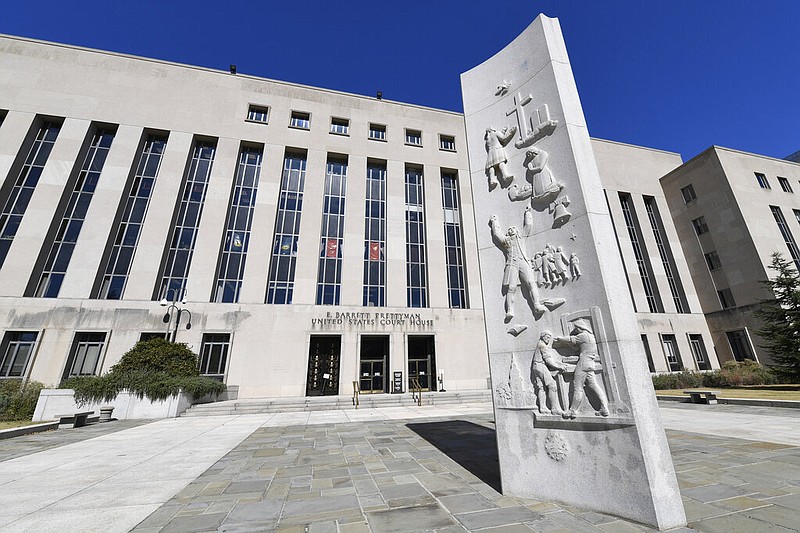Federal prosecutors have asked a District of Columbia judge not to postpone Richard "Bigo" Barnett's sentencing hearing, which is scheduled for May 3.
Jonathan Gross, one of Barnett's attorneys, filed a motion Monday night saying a 107-page decision issued Friday by the U.S. Court of Appeals for the District of Columbia "raises new issues that directly and specifically impact Mr. Barnett's case."
Gross wants more time to "properly review and analyze the complicated decision" in United States v. Fischer and decide if he needs to file supplements to Barnett's motions for acquittal or a new trial.
In a filing Wednesday, federal prosecutors said, "No such continuance is justified."
They argue that the appeals court decision in Fischer concerns defendants who "assaulted" police officers during the U.S. Capitol riot on Jan. 6, 2021, and Barnett is not accused to have done that.
Regarding the Fischer decision, the prosecutors wrote, "The Circuit court confirmed that the government may charge individuals who allegedly assaulted law enforcement officers while participating in the Capitol riot with corruptly obstructing, influencing, or impeding an official proceeding, specifically Congress's certification of the Electoral College vote, in violation of 18 U.S.C. § 1512(c)(2).
"The defendant -- who was not alleged to have assaulted law enforcement officers but who was convicted of violating 18 U.S.C. § 1512(c)(2) on a different theory -- asserts that the Fischer decision 'raises new issues that directly and specifically impact' his case but does not identify the issues or explain the impact."
The Fischer decision doesn't impact Barnett's sentencing guidelines calculation or other sentencing factors, according to the prosecutors.
"In other words, Fischer has nothing to do with the Court's determination of an appropriate sentence," they wrote.
And the court can't "grind this case -- and all of its cases involving Section 1512(c)(2) charges -- to a halt" while waiting for possible appeals of the Fischer decision to wend their way through the legal system on the way to the Supreme Court, according to the prosecutors.
The government also argues that Gross failed to show how the Fischer decision could impact his motions for acquittal or a new trial.
U.S. District Judge Christopher R. Cooper hadn't ruled on the dueling motions from Gross and the prosecutors as of Wednesday night.
18 U.S.C. 1512(c)(2) is one of the eight charges that a jury found Barnett guilty of after a two-week trial in Washington, D.C., in January.
Barnett faced enhanced charges for carrying a stun gun into the U.S. Capitol, where he posed for photos with his foot on a desk in House Speaker Nancy Pelosi's office suite.
He faces a maximum penalty of 47 years in prison.
Hundreds of participants in the Jan. 6, 2021, riot at the U.S. Capitol have been charged with violating 18 U.S.C. 1512(c)(2).
The statute reads:
"(c) Whoever corruptly--
"(1) alters, destroys, mutilates, or conceals a record, document, or other object, or attempts to do so, with the intent to impair the object's integrity or availability for use in an official proceeding; or
"(2) otherwise obstructs, influences, or impedes any official proceeding, or attempts to do so, shall be fined under this title or imprisoned not more than 20 years, or both."
On March 7, 2022, in the case of United States v. Garret Miller in the District of Columbia, U.S. District Judge Carl J. Nichols dismissed the charge against Miller, concluding that 18 U.S.C. 1512(c)(2) "must be interpreted as limited by subsection (c)(1) and thus requires that the defendant have taken some action with respect to a document, record, or other object in order to corruptly obstruct, impede, or influence an official proceeding."
Nichols granted similar motions to dismiss 18 U.S.C. 1512(c)(2) in two other cases. Federal prosecutors appealed those rulings.
A three-judge panel of the appeals court disagreed with Nichols in the ruling on Friday.
"The district court held that the statute does not apply to assaultive conduct, committed in furtherance of an attempt to stop Congress from performing a constitutionally required duty," Circuit Judge Florence Y. Pan wrote in Friday's opinion. "We disagree and reverse."

